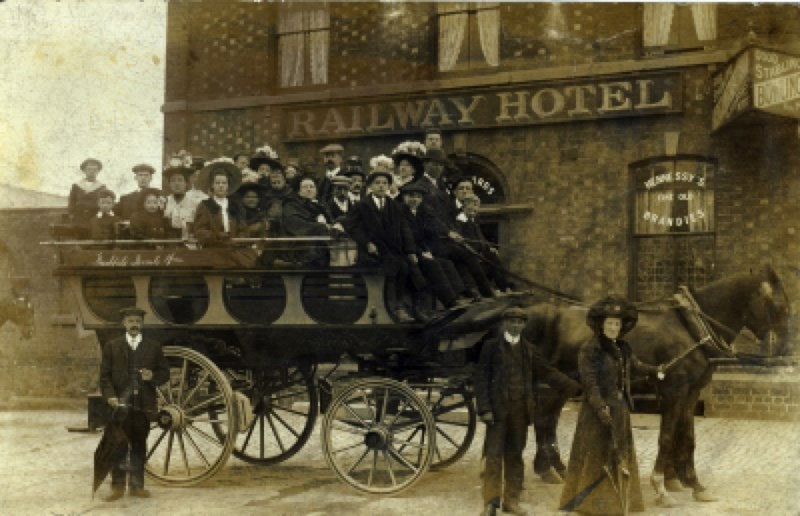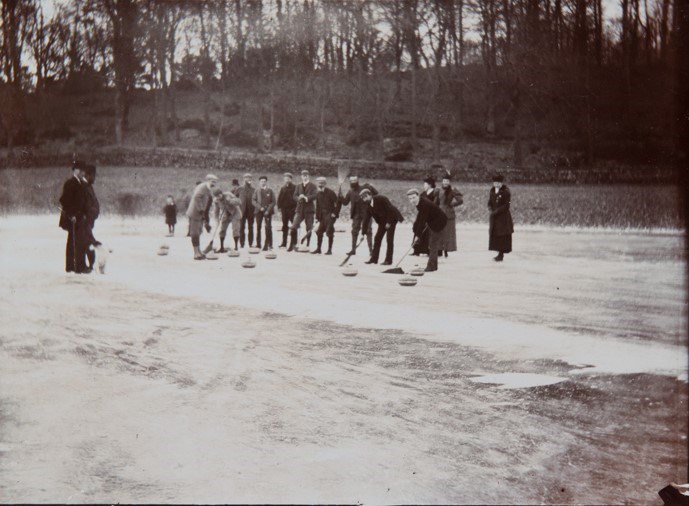
Working Man's Diary
Thornie
Added on 02 August 2024
Over the centuries, the folk of this parish (well, ordinary people everywhere) have come across as gingerbread men or women. Baked as they are, even individually, from a flour sifted from church and statutory records — births, marriages and deaths, census snapshots, valuation rolls — how could it be otherwise. Mishaps and misbehaviours reported in the local papers might add a smile, a frown, a sly wink here and there, but essentially, they come across as thin, flat, two dimensional. More recently, cross-referencing with documents, accounts, leases, rents etc in the newly catalogued castle archive has thickened the mix in some cases. The occasional photo helps, as do family anecdotes; but the latter just as often add unwanted ingredients leading to the warning, May Contain Nuts.
What’s lacking is the yeast of self-penned narratives, old letters, jottings and journals. Manna for the local historian, only rarer. During the Exodus it fell daily for the Israelites. It has fallen our way precisely twice.
The first is an account by Mary Donald Sutherland, born in March 1913 and the first bairn to be baptised in Murthly Church, of growing up in the village. An account sadly curtailed when fire destroyed the Inn (her father, Alastair, was the tenant) and the family left the village.
The second is the diary kept from 1887 – 96 by Alexander Campbell, an estate forester. He worked six days a week with few holidays. His Sundays are generally covered by “at church”, and a reference to the weather (assuming “dull” or “very dull” is just that).
The foresters were more than woodsmen. The estate squad varied in size depending on the work, which covered everything that wasn’t raising crops, tending livestock or gamekeeping. Taking care of Murthly’s magnificent trees, woods and forests yes, but also ditching, road mending, fencing, grass cutting, keeping busy in winter cutting and storing great quantities of ice for the Big House, bringing in each spring by beating the castle’s carpets, and responding to newly fashionable pursuits by laying a bowling green, a tennis court, a nine-hole golf course, even a cricket pitch in one of the grass parks.
Over the years, Alex in his daily one-liners found humour everywhere. He was never just emptying a cess pit but promoted to the Sewage Emporium; never howking loose stones out of a grass park, but carting diamonds.
Horse Bootees
Alex was born, out of wedlock, to Alexander Campbell and Margaret Swan on 7th July 1864, in Kilmorich, by Dowally. (That his parents eventually married is shown on Alex’s own marriage certificate in 1896.) His first job on the estate was walking at the head of a horse pulling a lawn mower, aged 15. For 1/6d a day. Probably also had the fiddly task of lacing up the leather bootees used to protect the grass from hoof impact. Within a couple of years, he was working alternately between the castle’s kitchen garden and the vegetable garden at Dalpowie Lodge. For 1/9d. By the summer of 1882, aged 18, the work was more varied and included actual forestry —” working oak coppice”— among routine labouring such as gravelling paths, and fencing. By that year’s end his wage had risen to 2/1d a day. Then in March 1883, he reached 2/10d a day. But that was his ceiling; the rate never changed until he left Murthly for a job in Abernethy in 1896. (Allowing for inflation, in today’s coin that still wouldn’t be much. Alex was working for the equivalent of £4 an hour.)
However, the estate had a motely collection of houses, cottages, even apartments in a pseudo Roman arch, that the lairds gave rent-free to workers. There are gaps in the record, but we know from the rental ledger for 1890 that Alex was living in one such, East Lodge, a saving of £4 per year. Possibly, from earlier than that, for the old account book he used as a diary has this address on the inside front cover, and it had notes of his going back to 1885.
In his diary years, Alex was young, single, occasionally a special constable, and actively involved with the Birnam Rifle Volunteers. He was sporty, enjoying highland games events in summer and curling in winter. Church was important to him; he rarely missed a Sunday service at Caputh, although occasionally he went to Spittalfield instead. On two occasions, he noted being invited into the manse after the Xmas service. The minister then was Rev. Theodore Marshall (later to become a Moderator of the General Assembly of the Church of Scotland). He was also either a member of the Caputh choir or a brass-necked blagger, for he attended its summer picnic three years on the trot. To such far-off places such as the Pass of Killiecrankie. (A fair day’s outing — 40 miles there and back — for a horse-drawn charabanc. Something like the photo below.)

Before starting on his diary, that is, before writing anything of his own, Alex began with a list. Behaviour any modern journaller would recognise. In this case, a list of tree species, “the correct nomenclature of native & imported timber on Murthly estate”. He also copied out the Conditions of Sale from 1885 for an important roup of timber, and began to write out the Particulars of Sale for the estates — which he would have found in a newspaper — when Sir Archibald had a rush of blood that year and put all of his holdings, Murthly, Strathbraan and Grandtully, the hale jing bang, on the market. (Sir was quickly reminded by the next in line, Walter Fothringham, that the estates were still subject to the law of entail, and not his to dispose of.)
Murthly Mutual Improvement Association
Most revealing of all, however, are the partial texts for two debating scripts. The subject of the first was “Poet or Soldier which have (sic) done the most good for Great Britain?” Which argued for the Soldier. In the second, the topic was “Whether was Sir Colin Campbell or General Havelock the greater General?” Arguing in favour of Campbell: drawn by the name, perhaps? These partial scripts — whether early drafts or copied from someone else — strongly suggest Alex was a member of the Murthly Mutual Improvement Association (Murthly MIA). This was a club for working men of the district looking to better themselves through discussion, formal debates and lectures. Part of a national, even international movement, the MIAs were an early form of lifelong education. They could be radical, liberal, closely associated with nonconformist religious movements, or not. Each had its own tone and tenor, its own articles of association; just thousands of small groups copying a basic idea. One surviving example, “Rules for the Management of Dunning Mutual Improvement Association”, adopted 8 January 1882, had just three:
i The annual sub shall be 3/-
ii The library shall be open every lawful day from 9am -10pm. Non-members to pay 1/6d per annum to use the Reading Room
iii A notebook shall be kept in which a member can propose the purchase of any book which he would wish introduced. (My italics.)
Not much is known of Murthly MIA as no formal records survive. (Although it certainly did not have a library or reading room. Just use of the school at Ardoch for evening meetings.) It was formed in 1879. One of its leading lights was Charles Scott, tenant of Bradystone farm, who acted as secretary, chairman and debater (perhaps not all at the same time). He emigrated to South Africa in 1886, found a reef of gold on his farm there and, true to the ethos of the MIA, taught himself geology, and formed a theory of a deep super reef that was eventually found 3,000 ft down by his son, decades later. Murthly MIA also made annual donations of £2 or £3 to Perth Royal Infirmary and held a dance in the school at the end of each debating season. In February 1896, a certain A. Campbell was one of several singers, male and female, to entertain the company before the dancing started.
Did membership of the MIA spur Alex to begin his diary, on 1st January 1887? It’s a (very) basic record of hard, repetitive work. Generally, one line per day. The most prominent character was the weather. Through it are interwoven key events, such as when the squad had to prepare the crypt beneath the chapel after Sir Archibald died. Although a more memorable date for Alex was 11 August 1892, when they were all given the day off on the occasion of a visit by the Scottish Arboricultural Association.
 In those years the estate positively swarmed with the Great & Good, but of them the diary knows nothing and says less. Not even a mention for Sir John Everett Millais and Effie Gray then resident in Dalpowie Lodge (or Birnam Hall, as Sir Archibald insisted it be called) for six months of the year. Yet obviously he would have known they were there, would have doffed his bunnet if they had come into the garden while he was working. But Alex is not into gossip, just the facts.
In those years the estate positively swarmed with the Great & Good, but of them the diary knows nothing and says less. Not even a mention for Sir John Everett Millais and Effie Gray then resident in Dalpowie Lodge (or Birnam Hall, as Sir Archibald insisted it be called) for six months of the year. Yet obviously he would have known they were there, would have doffed his bunnet if they had come into the garden while he was working. But Alex is not into gossip, just the facts.
Although he had some feeling for the extraordinary . . . This from 19th January 1895:
Very severe frost. This day was rendered famous from the fact that a Curling match was Played on the Tay below Stenton. The Rinks were composed of Curlers from Murthly Castle Club. A novel feature of the occasion was the Cooking of lunch on the ice. Dancing was afterwards engaged in to the stirring notes of Bob Keay’s fiddle. Conspicuous @ the hop of the first Reel was an elderly lady of pleasing and substantial appearance who hoofed it right merrily.
That small mention of Bob Keay . . . Something to leaven the mix of his story. Robert Keay was then a young gamekeeper, working from the kennels at Kingswood. His older brother, James, was one of Millais’ favourite ghillies, and a pallbearer at the artist’s funeral in Westminster Abbey in 1896. We hadn’t known of Bob’s fiddle playing but were aware that later in life he and his family lived in one of the apartments in the Malakoff Arch. Which, of course, had a dance-hall in the crosspiece, scene of a many a fine ceilidh for estate folk. Nothing like being able to thump on the floor and cry, “Send up a fiddler!”
In a sense, everything interesting happened for Alexander Campbell after he left Murthly and 2/10d a day. Promotion to land steward, marriage to Mary Ann Stewart, a farmer’s daughter from Caputh in November 1896, and the births of their children all followed, and he lived until 1937. However, as far as we know his career as diarist ended. Pity that. We were just getting to know him.
Notes
Thanks to Alex’s great great granddaughter, Ailsa Birchenough, for preserving and scanning the diary.
Information on Alex’s pay comes from Foresters Timebooks in the castle archive.